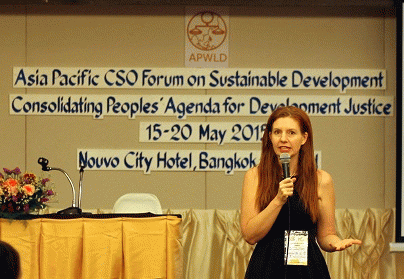Without robust accountability and monitoring mechanisms, how will people ensure that their governments deliver on the promises they make towards post-2015 sustainable development agenda? Past experience tells us that governments may make promises at the global level but seldom translate them into ground realities back home! Even worse is when at times the commitments made by governments in one treaty are contradictory to their obligations in another! Profit-driven corporations often have a major influence in policy making and thwart measures that may harm business interests.
Heart wrenching human rights violations done by corporations in so many countries globally, who are not even held to account for these violations, is a living example of what happens when pro-people accountability systems wither away. So it is important to ensure that accountability is top on agenda while we discuss beyond-2015 development framework.
Kate Lappin who leads Asia Pacific Forum on Women, Law and Development (APWLD) made a strong case to mobilize civil society to have a high ask when it comes to accountability and monitoring mechanisms in these processes. She was addressing participants of the Asia Pacific Civil Society Forum on Sustainable Development in Thailand. She shared recommendations for possible roles High Level Political Foum (HLPF) can play in this direction.
What is High Level Political Forum?
In the 2012 UN review conference of Rio+20 (signifying 20 years of UN Economic and Social Council (UN-ECOSOC)'s annual sessions on sustainable development), governments agreed to replace the Commission on Sustainable Development (CSD) with a High Level Political Forum (HLPF). Hence HLPF became another process to effectively shape the beyond-2015 sustainable development agenda. There were other processes too, such as Open Working Groups (OWGs) which concluded with a list of 17 Sustainable Development Goals (SDGs) and 169 targets. Another process was Intergovernmental Committee of Experts for Sustainable Development and Financing, which concluded after 10 sessions (July 2013-August 2014).
HLPF is unique in a way that it is rooted not just in UN ECOSOC but also in the secretariat of UN General Assembly. Another unique aspect of HLPF is that its resolution supports regional processes to feed in, but the other two processes mentioned above are largely 'New York centric'. Hopes are high that HLPF could be one of the ways to call for strengthening accountability and monitoring mechanisms around post-2015 development agenda.
Kate Lappin of APWLD said: "We have nearly got to the stage where we have some sense of what the goals and targets are going to be, so now we need to ensure how can we use them to be something more than rhetoric." After all we do want the governments to deliver on the promises they make towards these goals!
Policy coherence: No more 'One hand gives, other hand takes'
(Note: You can view every article as one long page if you sign up as an Advocate Member, or higher).






